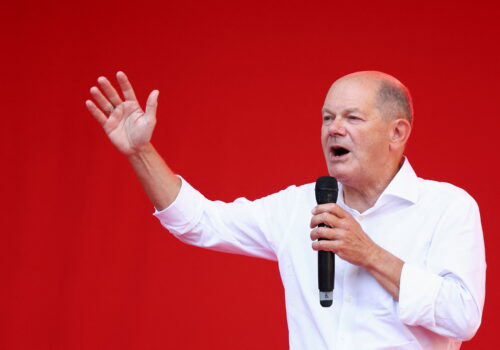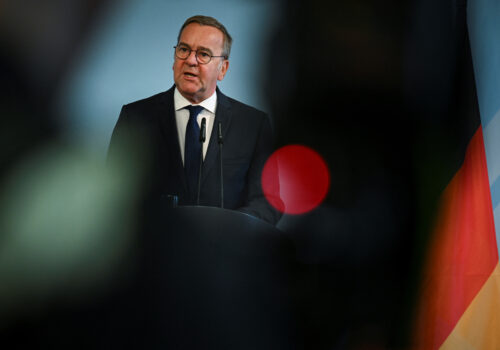Experts react: Scholz’s coalition has collapsed. What’s next for Germany?
The traffic light is flashing red. On Wednesday, German Chancellor Olaf Scholz sacked Finance Minister Christian Lindner, ending the ruling government’s “traffic light” coalition of Scholz’s Social Democratic Party (SPD), Lindner’s Free Democratic Party (FDP), and the Greens. Scholz, whose public support is flagging, also announced that the parliament will hold a confidence vote in his government in January. This vote could move the next Bundestag elections up to March 2025, and it comes as far-right and far-left political parties are making inroads with German voters. Below, our experts explain the latest Sturm und Drang out of Berlin.
Click to jump to an expert analysis:
Jörn Fleck: The coalition partners lacked leadership and a shared vision of “progress”
Carol Schaeffer: A “Macron-level gamble” by the German finance minister
The coalition partners lacked leadership and a shared vision of “progress”
It started in 2021 as a hopeful three-way “Fortschrittskoalition,” or coalition for progress, after sixteen years of Merkelian status-quo politics in Europe’s largest economy. Three years, a major ongoing European land war, and a series of German economic woes later, that uneasy alliance among the SPD, the Greens, and the FDP had devolved into a dysfunctional government of estranged, feuding former allies. On Wednesday, it reached a breaking point: Germany’s “traffic light” coalition collapsed the same day Donald Trump was declared the next US president. But rather than push German angst to a fever pitch amid so much seeming global instability, the end of the coalition, a confidence vote, and potential early elections by March 2025—all things Germany’s postwar constitution guards against—may be seen as a reprieve, both at home and across Europe. Better a horrible end than endless horror, as the German saying goes.
Months of acrimonious infighting and an ever-shrinking consensus among the three unlikely partners contributed to a gloomy outlook for Germany’s economy, which has narrowly avoided a recession and which the International Monetary Fund downgraded to zero growth for 2024 two weeks ago. Any concerted government effort to address structural economic challenges to Germany’s economy and thereby revive Europe’s once much-envied engine of growth repeatedly failed amid competing proposals, leaks, and public recriminations among the Green economy minister, Robert Habeck, and Lindner, under absent leadership from Scholz.
Major transformational projects—from the green energy transition to Germany’s Zeitenwende (turning point) in defense and foreign policy were poorly executed, too often renegotiated after having been already agreed, or killed by political deadlock. The coalition’s genuine achievements—managing to wean Germany off of Russian gas at record speed, emerging as Europe’s leader in supporting Ukraine, and stepping up with a permanent deployment of a German brigade on NATO’s eastern flank—went undersold and unnoticed.
Ostensibly, the fight over how to fill multibillion euro gaps in the 2025 budget amid a stalling economy and dwindling tax revenues broke the coalition’s back, with much help from Lindner’s brinkmanship in recent days and weeks. More fundamentally, the three partners could not reconcile the limits of narrow German fiscal orthodoxy and its constitutionally enshrined centerpiece of the debt brake with a set of supercharged geopolitical and geoeconomic challenges that demand greater German leadership. Nor did they seem to share a coherent vision of the progress they set out to achieve and the resourcing needed to do so. The dysfunction and paralysis in Berlin often extended to Brussels, as coalition infighting prevented German leadership and clear positions on key issues or threatened to unravel carefully constructed compromise deals by the twenty-seven European Union (EU) member states on the homestretch.
For German citizens at home and for allies in Europe and abroad, greater political clarity and leadership in Berlin might be elusive even after the end of the coalition. Germany needs to have an honest debate with itself about what it takes to step up and navigate a challenging fiscal, economic, and geopolitical environment, much like it did in the early 2000s. The debt brake and German obsessions with it ought to be part of such a discussion.
But there are few signs of such a debate across the country’s political landscape, which has splintered in line with trends across European countries. The extremist Alternative für Deutschland (AfD) on the right and the former communist politician Sahra Wagenknecht’s BSW on the left have emerged as insurgents that meet in a horseshoe formation on nationalist, social, and pro-Russian positions. The once-dominant center-right Christian Democrats (CDU) lead polling at around 33 percent. All three “traffic light” coalition partners have dropped in the polls significantly, with Lindner’s liberals even falling under Germany’s 5 percent federal threshold to make the Bundestag. While a slight majority of Germans in a poll published this week support early elections, it’s unclear whether and how the electorate might punish or reward different actors for their role in the coalition’s collapse.
So the next coalition formation might not be much easier than the 2021 negotiations that led to the “traffic light.” Current polling suggests the CDU would have the limited choice of another grand coalition with the SPD or its favorite nemesis of the last three years, the Greens. Still, if Scholz does proceed with a confidence vote in January and the German president agrees then to call early elections in March, a fresh start might be the next best chance for Europe’s former powerhouse to find its footing.
—Jörn Fleck is the senior director of the Atlantic Council’s Europe Center.
A “Macron-level gamble” by the German finance minister
The long-suffering German coalition has finally broken after hanging on by a mere thread for much of the last year. The decision comes just a month before the deadline for the federal budget for 2025 and many inside the government were hoping that it could linger on, especially in the destabilizing event of Trump’s victory in the United States, announced early in the morning European time.
Speculation of a collapse had been mounting since Lindner wrote a position paper that seemed designed to antagonize his more left-of-center coalition partners. Many in government saw the paper as a “divorce document” designed to force his coalition partners to throw him out—which they did. Despite concession efforts on the part of Habeck and Scholz, the government failed to keep the coalition together.
Lindner’s maneuvering to leave the government on a principled stance is a Macron-level gamble, designed to hopefully bring his party back above the 5 percent threshold necessary to maintain a presence in the Bundestag.
Many Germans and international observers are painfully aware that the country’s economy cannot be pulled out of a slump with the debt brake in place. However, support for the fiscal rule remains high, with a poll released earlier this year indicating that 61 percent of Germans were opposed to loosening the brake. But this overall support masks internal party divisions, with 55 percent of SPD voters and 67 percent of Green voters in favor of reforming the debt brake.
The FDP’s position has been that suspending the debt brake is a politically risky move, given the apparent high levels of support for keeping it in place, and it is a legally risky move, given that the constitutional courts blocked an attempted circumvention of the debt brake last year. But by exiting the government and facing potential dissolution, the FDP will be forced to work directly with the CDU, which will still need to form a governing coalition. And all parties will then likely have to face the reality that to save the floundering economy some reform of the debt brake will be needed.
This was the first three-party system since the 1960s and evidence of a fractured electorate after the sixteen-year tenure of Angela Merkel, the third-longest serving chancellor of Germany.
Moreover, Germany often has been seen as the lodestone of Europe, holding together a sometimes tempestuous EU. This government collapse signals the potential for an era of turbulence in Europe’s near future. But it might be the best chance Germany has of turning the page.
—Carol Schaeffer is a nonresident senior fellow with the Atlantic Council’s Europe Center
Europe needs stability and strength. For the moment, Germany is providing neither.
Scholz has called for a vote of confidence in January, likely followed by early elections. That means even in the best case, a new government is unlikely to take office before May—with coalition negotiations potentially extending this timeline further.
That’s a long time for Germany to be thrust into political upheaval, particularly at a time when European stability depends on its strength. The reelection of Trump introduces new uncertainties for transatlantic relations and global security. Scholz’s budget deal contained, among other aspects, a proposal to increase Germany’s support for Ukraine ahead of a tough winter. After the US election, this measure was intended to send a clear signal that Germany is a reliable partner to its allies.
There was hope that the three coalition parties could set aside their differences in light of Trump’s reelection and the intensified need for strong transatlantic cooperation. However, the government’s collapse makes it clear that it was no longer able to play the cohesive, robust role that Europe needs. Internal conflicts have delayed agreement on a supplementary 2024 budget, and prospects for the 2025 budget remain similarly contentious.
Scholz recognized the increased uncertainty, pledging on Wednesday to strengthen transatlantic ties and work with the new Trump administration while investing in a resilient EU. However, achieving these objectives requires a stable government, not one mired in internal discord. Such stability appears out of reach.
From a security policy perspective, there may be a long-term upside to a new government for transatlantic relations, particularly with a Trump-led United States. New elections could open the door for a government more amenable to substantial increases in defense spending—a key area of criticism from Trump. Under the current government, Germany’s defense budget only barely met NATO’s target of 2 percent of gross domestic product in 2024, thanks mainly to spending from the off-budget one-hundred-billion-euro special fund that was created in 2022 and will run out by the end of 2027. Lindner’s strict adherence to the debt brake has hindered meaningful progress on a true Zeitenwende in German defense policy. A new government has the opportunity—and responsibility—to initiate a serious, sustainable increase in defense spending, sending a clear signal of commitment to allies and partners.
While the future holds potential, the immediate reality is immense uncertainty, and it could remain in this state for some time. Scholz has shown a willingness to collaborate with CDU leader Friedrich Merz on economic and defense matters, which might help to bridge this transitional period, but Germany will remain in a vulnerable position in its dealings with the United States until a more stable government is in place.
—Theresa Luetkefend is an assistant director in the Atlantic Council’s Forward Defense program.
Further reading
Wed, Oct 2, 2024
Three state elections have backed Germany into a corner
New Atlanticist By
The recent successes of populist parties in Germany’s state elections could signal an imminent shift in Berlin’s policies on climate, immigration, and aid for Ukraine.
Wed, Oct 9, 2024
Germany has committed to improving its defense. Its budget needs to reflect this.
New Atlanticist By
Without a long-term shift in Berlin’s mindset on defense, even Germany’s most promising defense projects won’t reach their full potential.
Mon, Sep 9, 2024
Defense technology and innovation in Germany
Report By
This paper explores the critical aspects of defense technology and innovation within the German armed forces, detailing the necessity for innovation, the role of defense innovation hubs (specifically the Bundeswehr Cyber Innovation Hub CIHBw), the significance of software-defined defense, the contribution of venture capitalists, and the importance of a supportive legal framework.
Image: German Chancellor Olaf Scholz attends a media briefing at the Chancellery after sacking Finance Minister Christian Lindner following a meeting with the heads of the so-called "Traffic Light Coalition" of the Social Democratic Party (SPD), the Greens and Lindner's Free Democratic Party (FDP), in Berlin, Germany, November 6, 2024. REUTERS/Annegret Hilse


